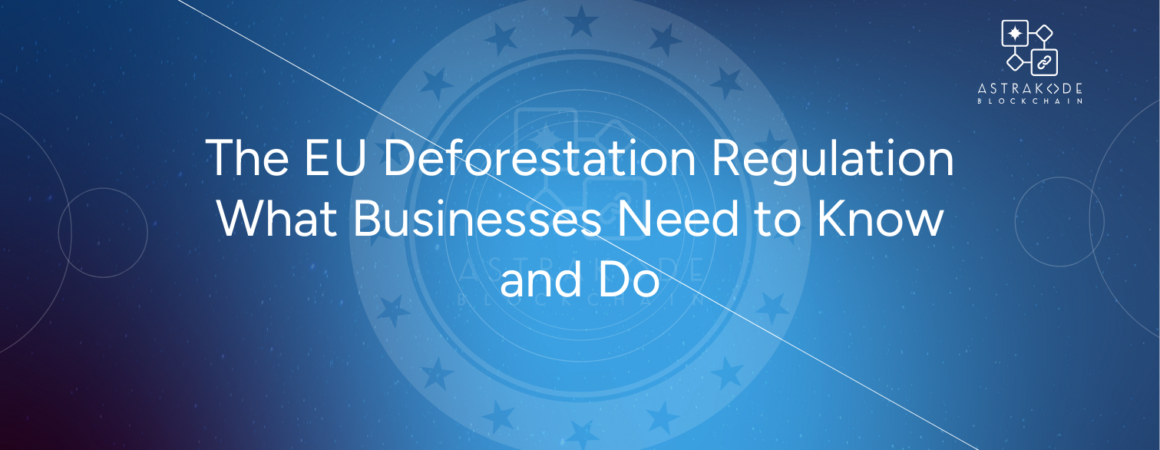The EU Deforestation Regulation: What Businesses Need to Know and Do

The EU Deforestation Regulation (EUDR) is a policy framework aimed at mitigating the environmental impact of deforestation. As part of the EU Green Deal, it aligns with broader strategies to protect forests worldwide. The European Commission is responsible for enforcing and implementing the EUDR, working alongside partner countries and companies to transition toward deforestation-free supply chains. With this article, we will discuss and cover what the EU Deforestation Regulation (EUDR) is, along with the major details you should know.
Overview of the EU Deforestation Regulation
The EU Deforestation Regulation (EUDR) aims to minimize the EU’s contribution to global deforestation and forest degradation. Adopted by the European Commission, this new regulation requires companies to ensure that their products are deforestation-free. It targets key commodities associated with deforestation, including soy, palm oil, beef, wood, cocoa, coffee and more. Effective from December 2024, the regulation mandates that businesses on the EU market provide a due diligence statement proving their supply chains are not contributing to deforestation.
Key Objectives of the EU deforestation Regulation
The primary objectives of the EU Deforestation Regulation are:
- Reduce Global Deforestation: By restricting the import and sale of products linked to deforestation, the regulation aims to combat global deforestation and forest degradation.
- Ensure Deforestation-Free Products: The regulation enforces the traceability of commodities to their origin, ensuring products sold in the EU market are deforestation-free.
- Enhance Supply Chain Transparency: Businesses must implement strict traceability measures and provide evidence that their supply chains do not contribute to deforestation.
- Strengthen Due Diligence: Companies are required to submit a due diligence statement, demonstrating compliance with the regulation and their commitment to sustainable practices.
Compliance Requirements for Deforestation-Free Products
The EU Deforestation Regulation (EUDR) sets forth several key conditions that businesses must meet to ensure compliance and support the regulation’s goal of curbing deforestation and forest degradation. Understanding these conditions is crucial for companies aiming to align their operations with the new requirements.
Traceability Requirements
One of the core conditions of the EUDR is the implementation of robust traceability systems. Businesses must be able to trace the origins of the commodities and products they sell in the EU market. This includes:
- Detailed Documentation: Maintaining comprehensive records of the supply chain, from the point of production to the point of sale.
- Verification of Sources: Ensuring that the sources of commodities are verified and certified as deforestation-free.
Risk Assessment and Mitigation
Companies must conduct thorough risk assessments to identify potential links to deforestation within their supply chains. This involves:
- Risk Evaluation: Evaluating the likelihood that commodities are associated with deforestation or forest degradation.
- Mitigation Measures: Implementing measures to mitigate identified risks, such as sourcing from certified suppliers or regions with low deforestation risk.
Due Diligence Statement
A crucial requirement under the EUDR is the submission of a due diligence statement. This document must:
- Confirm Compliance: Assert that the products comply with the deforestation-free criteria set by the regulation.
- Provide Evidence: Include evidence supporting the claim, such as certificates, traceability records, and risk assessment results.
Businesses also need to keep detailed records of where their products come from and the steps they take to avoid deforestation. They must submit this report, called a due diligence statement, to show they are following the rules. This statement explains what they did to check their supply chain and proves their products are deforestation-free.
Who is Responsible for Due Diligence?
EU operators and traders (except for SMEs) are required to set up and maintain a Due Diligence System to ensure that the products they place on the EU market are deforestation-free. This involves gathering and verifying detailed information about their products and their origins. Small or micro-enterprises can mandate a larger company in the supply chain to act as their authorized representative. However, the original operators and traders still retain responsibility for compliance with the regulation.
More on Due Diligence: Due Diligence – European Commission (europa.eu)
Non-Compliance and Corrective Measures
If a business fails to comply with the EU Deforestation Regulation (EUDR), the competent authority will require the operator or trader to take corrective action within a specified and reasonable period. Authorities have the power to enforce the correction of any formal non-compliance, such as failure to maintain due diligence statements. They can also impose a ban on the item being sold in the EU or exported, order its immediate withdrawal or recall, or mandate donation to charity or disposal of the products.
Penalties for non-compliance, laid down under national law, must be effective, proportionate, and dissuasive. These may include fines proportional to the environmental damage and the value of the items, increasing with repeated infringements, with a maximum fine of at least 4% of the Union turnover in the preceding year. Authorities may also confiscate the products or revenues gained, temporarily exclude businesses from public procurement and funding, and impose temporary or permanent prohibitions on dealing in the EU or using the simplified due diligence process. Member states will inform the European Commission of final judgments against legal persons within 30 days, and the Commission will publish details of the infringements and penalties imposed.
Timeline for Implementation and Compliance Deadlines
The EU Deforestation Regulation (EUDR) will take effect on December 30, 2024 and SMEs have until June 30, 2025. By this date, companies must have systems in place to trace their products back to their sources and assess any risks of deforestation. These steps are essential to ensure that the commodities they sell in the EU market are not contributing to the loss of forests.
In early 2025, businesses will need to submit their first due diligence statements. These statements are reports that show how companies are complying with the new regulation, detailing their efforts to keep their supply chains deforestation-free. After the initial submission, companies must continue to monitor their supply chains regularly. This means conducting audits and compliance checks to ensure that their products remain deforestation-free and meet the EUDR requirements.
The European Commission, along with EU member states, will help enforce these rules and support businesses in making the transition to sustainable practices. By following these timelines and requirements, companies can play a significant role in reducing global deforestation and promoting sustainable trade practices.
More on the timeline: Timelines – European Commission (europa.eu)
Blockchain’s Vital Role in Meeting EUDR Standards
Blockchain technology is essential for businesses striving to comply with the EU Deforestation Regulation. The regulation’s primary objectives, reducing global deforestation, ensuring deforestation-free products, enhancing supply chain transparency, and strengthening due diligence demand robust and reliable tracking and verification mechanisms. Blockchain offers precisely that by providing transparent and immutable records of product origins.
By utilizing blockchain, businesses can achieve unparalleled traceability and accountability in their supply chains. Each transaction is securely recorded on a decentralized ledger, making it nearly impossible to alter or tamper with the data. This transparency allows companies to verify that their products are not linked to deforestation, thus ensuring compliance with the regulation. Furthermore, blockchain facilitates real-time monitoring and reporting, which simplifies the due diligence process and provides concrete evidence of compliance.
More reads ->
- Explore our Pre-Built Agri-Food supply chain solution
- How blockchain technology work and use cases
- How Blockchain is Shaping the Future of ESG
Conclusion
The EU Deforestation Regulation (EUDR) places significant responsibilities on businesses in the EU market to ensure their products are not linked to deforestation. Companies must conduct thorough risk assessments of their supply chains and implement traceability systems to track product origins. They must also submit due diligence statements proving compliance with the regulation. Non-compliance can result in severe penalties, including fines and market restrictions. While both large companies and SMEs are affected, SMEs have until June 30, 2025, to fully comply, with simplified obligations for SME traders.
For businesses, this means adopting more sustainable and transparent operations. It also means they need to implement and keep up with technology that helps them comply, like blockchain. At AstraKode Blockchain, you will be able to integrate enterprise-level blockchain with low-code tools for your smart contract development and blockchain networks. Our platform also offers industry-tailored, pre-built solutions for Agri-food supply chain management, and more.



